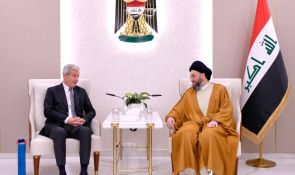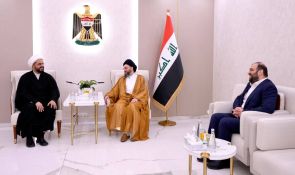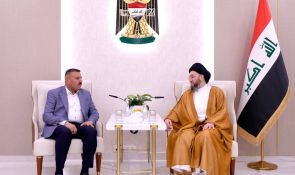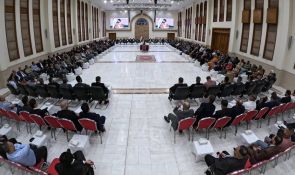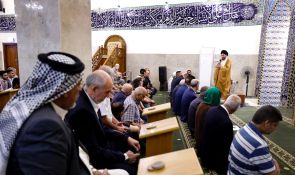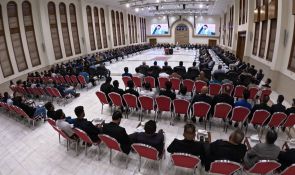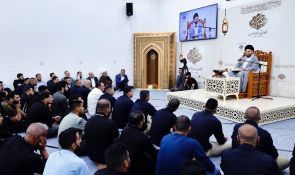Sayyid Ammar al-Hakim: “Not assaulting or encroaching on others represents one of the basic characteristics that regulate the social relationship.”
Our talk in past meetings was about the Islamic theory of leadership and administration. We indicated that the leadership network, in Islam’s view, requires a group of conditions, features and qualities that must be available. It regulates the relationship among them so it may become a successful and effective network capable of achieving the requirements and anticipated outcomes.
We stated that we do not mean by the leadership network only the leaders of the nation and people, who the king, president, cabinet minister or the like is. Rather, it extends to incorporate all leadership levels up to the family which is the small seed when led by the head of the family and when it is administered by an individual, the husband, up to the high levels. Anyway, the characteristics must be available in every official regardless of his responsibility, according to the Islamic viewpoint. Based on this background, we talked about six excerpts from the pact of the Commander of the Faithful (Ú) for Malik al-Ashtar when the latter became his provincial governor of Egypt. It is the pact that represents an important historic document that summed up the Islamic theory of leadership and administration in short and brief statements.
ALLAH ALMIGHTY IS STRICT WITH THE UNJUST OFFICIAL
Our talk in the previous forum was about equity and its significance for the official and the latter’s responsibility for being fair with his relatives, family, group and people who are affiliated with him. If he is equitable to the subject about whom he is responsible, and if he tilts the scales of himself, his family, party or group over others in work concessions and powers as well as in opportunities, etc., he will have fallen into injustice. We said that injustice is something bad, but injustice that originates from an official is worse, greater, weighs heavier and costlier. There is a strict stance of Allah Almighty towards an unjust official. We explained this statement during the time of the Commander of the Faithful (Ú): “One who is unjust to the servants of Allah, He, rather than His servants, will be his opponent.” The issue here takes greater dimension. Allah Almighty makes Himself in the position of defending [His servants] and disputing with this oppressor: “If one disputes with Allah, He will refute his argument.” The oppressor loses the plan’s legitimacy. He will also lose the legitimacy of the issue and of the position: “… and Allah will be his foe.” Whoever oppresses Allah’s servants enters into war with Allah Almighty “until he stops and repents,” until he is forgiven by those whom he oppressed, returns to his senses, disseminate justice and equity among the Almighty’s servants.
LIGHTS AND LESSONS
The first light: We talked about it in the previous forum, which is: the status of oppressing Allah’s servants, the unjust official, his status and position as seen by the heavens. We said that the official’s injustice is greater and harsher than what is imagined, and the divine position is tough towards the unjust official. We reviewed the texts in this regard.
The second light: It is when an official oppresses without a justification, evidence or proof. The reason for this is that the official, by virtue of his position, his having authority and clout, he can pressure those who are under him in the sphere of responsibility and abuse him. He also is more capable of injustice than the ordinary individual. Also, taking advantage of his position and leading impact to pressure people is greater. The human nature makes man always willing to dominate and take control of others. He wants people to do things according to the way he sees them, to do as he does; such is the human nature. When this human nature has power, influence and responsibility in any particular leading level, it is possible one uses this influence and authority to force people to deal in the way which he wants. Thus, he will rob them of their liberty while thinking that what he does, thinks and says is always in the best interest of these people and is the most suitable and beneficial for them. He tries to turn all people into one color and one way of thinking.
An official’s injustice is more dangerous, painful and effective than the injustice that comes from others.
For this reason, the injustice an official initiates becomes more serious, more painful and more impacting than the injustice that may be caused by others. This makes the justifications, pretexts and proofs presented by the official to justify certain norms of conduct unconvincing according to the Islamic way. This is noticed by man in his life. Even tyrants and oppressors who made the mass graves and killed people by the thousands can be seen justifying their actions. A person in charge always tries to condition his conduct and stances in a “legal” way. Thus, the wronged person is turned into a wrongdoer, an outlaw, one who violates the commitments and procedures…, up to the judgment and opinion of these oppressors. Such is the danger that comes from an official. But when the official oppresses, the oppressed become indicted and not the oppressor. This is why you find large scale emphasis and warning by Allah Almighty against the official practicing injustice no matter what his position of leadership may be.
Notice the sacred tradition on p. 280, Vol. 4, of Ghurar al-Hikam: “One who oppresses people will be on Judgment Day hurled into the calamity of his injustice, tormented, deprived, broken-hearted, lowering his head” when his reality is unveiled before the public. On the Judgment Day, matters will appear as they are. The oppressor will be indicted, broken and deprived according to the tradition.
Employing a blessing in the obedience of Allah and in serving people:
On p. 320, Vol. 75 of Bihar al-Anwar, it is recorded that the Commander of the Faithful (Ú) was asked, “What sins brings the swiftest penalty for one who commit it?” He (Ú) said, “It is that of one who oppressors someone who is helped only by Allah.” The individual who has neither a party nor a support that protects him when he oppresses goes directly to Allah Almighty with a broken heart. This equation is amazing, the equation of the heavens. On earth, whoever has money, prestige and relations will have a coveted social status and more immunities. But in the logic of the heavens, if one does not have such prestige and position that protects him, the greater his fortune in the heavens will be and the greater the status. This issue is linked to one when he has certain means of pressure. Let us first ponder on these means:
For example, when one wants to borrow a sum of money, he goes to his wealthy and well-to-do relatives. For this reason, the least of us that is sought by people is the one whose status with Allah is greater because he will be more than others dedicating himself to Allah Almighty, more than anyone else in his pleas to Allah Almighty: “One who oppresses someone whose only supporter is Allah and who combined a blessing with shortcoming…,” “If you thank, I shall give you an increase.”
The duties and responsibilities associated with a blessing, any blessing, the blessing of position, of serving people and solving their problems…, perhaps a pen that benefits people, etc., demonstrating appreciation for such a blessing is done by fulfilling the commitments with which it is associated. One who receives a blessing and who does not thank Allah, nor does he employ it properly, such as when Allah Almighty grants money and beauty to someone, but he does not use it properly, employing it in disobeying Allah, this, too, speeds up the penalty of Allah, the most Praised, the most Exalted One. It is quick to reach one who is unfair to a poor person. Do not display your strength and muscles to a poor wretched person because, for example, desiring to apply the law to squatters, as if there is no other problem in Iraq! One who shows his power to the poor receives a swift penalty according to Islam’s logic. So, the injustice of any official accepts neither a justification nor a pretext.
The Commander of the Faithful (Ú) is quoted as having said, “The Day of Justice is harder on the oppressor than the day when the oppressor oppressed.” So, when an oppressor oppresses, because of one having been oppressed, people sympathize with him. They supplicate for him. His heart is broken. He directs his attention to Allah and feels that he is under pressure. There is perfection, degrees and might from Allah in favor of his oppressed condition. He is in prison cells, yet he feels the might because of his sincerity. Due to being oppressed, people sympathize with him. As for the oppressor, on the Day when he meets his account, when his cards are uncovered, he will find people sensing the vendetta towards him, feeling glad after knowing what end this oppressor will be getting. During the last months, we have come to see the oppressors who received what is due to them in several Arab countries, how nobody sighed for them but the contrary is true: This is so because people remember their assaults and oppressive deeds. For this reason, the day of the oppressor is harder than that of the oppressed.
THIRD LIGHT:
The reality of an official’s injustice is actually a war with Allah, the most Praised, the most Exalted One: “… and he will be in war with Allah.” The Commander of the Faithful (Ú) does not say that the oppressive official is fought; the Commander of the Faithful uses the infinitive to refer to him, something which refers to the intensity of retribution. When the infinitive is used, it means that this is a reality with regard to this individual. The unjust official does not fight for the sake of Allah. No, he is in a state of war and hostility with the heavens, with values and principles when he thus abuses Allah’s servants and takes advantage of his position to oppress people.
FOURTH LIGHT:
The oppressor shall receive no salvation unless he returns to wisdom, to his senses, when he synchronizes with the values and constants and return rights to those whom he oppressed. There is no other solution. “He enters into war with Allah Almighty until he stops and repents.” Unless he abandons his injustice and seeks forgiveness of Allah, the war with Allah continues for this unjust official.
There are three types of injustice: injustice which is not forgiven, injustice which is not abandoned and injustice which is forgiven and not sought.
Ali (Ú) says the following in sermon 176 of Nahjul-Balagha: “There are three types of injustice: Injustice which is not forgiven, injustice which is not abandoned and injustice which is forgiven and not sought. As regarding the injustice which is not forgiven, it is associating a partner with Allah (committing shirk). Allah says that He does not forgive anyone who associates others with Him. Attributing partners to Allah Almighty is unforgivable. As for the injustice which is forgiven, it is a servant of Allah sometimes committing injustice against his own self.” Someone commits some small sins: He things about something; he looks at something; he makes a decision but he reverts from it. This is prohibitive. There are small sins which one commits. These are prohibitive. One must not commit them as much as possible. But man is not infallible, and he makes certain mistakes. These small mistakes can be forgiven by Allah Almighty if one stops committing them. As for the injustice which is not abandoned, it is the Almighty’s servants being unjust to each other. This type of injustice is not forgiven unless one repents and makes amends. Retribution here is tough. It is not hurting the feelings. It is not stabbing with a knife, nor is it whipping. But it is what is viewed as being “small”. Retribution on the Judgment Day will be for one who is unjust to another; it is greater than stabbing or whipping. Retribution against the unjust person is tougher. The oppressor wishes to be stabbed with a knife or hit with a whip when he sees the divine penalty for the injustice which he committed. It is here that we see how Islam emphasizes this issue. Not assaulting or abusing others represents one of the basic and important characteristics that regulate the social relationship. The official must not extend his authority and influence to abuse others and rob them of their rights. We plead to Allah to keep us distant from injustice, to disseminate among us tolerance, justice and equity.


